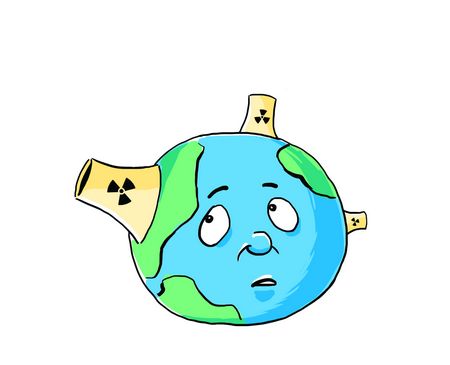Can 'clean' nuclear power save the world?
|
|
|
[By Zhou Rui/Global Times] |
In the classroom, I always tell my students not to use clichés in writing. But in my column this week, I have to deal with two cliched topics: nuclear power and global warming.
The earthquake and tsunami that hit Japan on March 11, created the worst nuclear crisis since the Chernobyl disaster. Three weeks after the nuclear crisis in Japan, small traces of radioactive dust have swept across China. Chinese media are asking the fearful question: Will our planet be ended by nuclear disaster?
The Fukushima nuclear crisis has not changed China's plans to implement its ambitious nuclear power program. Chinese energy and environmental officials are firm in their defense of nuclear power. They are losing no time in giving fresh attention to nuclear energy in the name of protecting our earth from being harmed by global warming.
On Saturday, Chinese Minister of Science and Technology Wan Gang told a press conference that "more investment should be put into current research on nuclear energy."
"Some lessons we learn from Japan will be considered in the making of China's nuclear power plans," Vice Minister of Environmental Protection Zhang Lijun said in a recent interview, "But China will not change its determination or its plans for developing nuclear power."
In the aftermath of the disaster, global warming will help rehabilitate the nuclear energy plan in the eyes of the journalists, environmentalists and the public. Chinese policymakers say the plan makes sense because it would mean less reliance on coal and fewer emissions tied to global warming.
"China has been under increasing pressure for emission reduction in the next five years. China needs nuclear energy to reach the goal of combating climate change," Zhang Guobao, former minister of the State Bureau of Energy, said in the 2011 International Conference on Low Carbon Energy and Climate Change on March 25.
Assuaging public panic about nuclear power, Chinese nuclear industry officials and their pundits have argued that Chinese reactors are not exposed to earthquake risks. The nuclear scientists say that Chinese reactors use a design different from the stricken Japanese reactors.
China started its first nuclear power plant in the early 1980s. With the issue of climate change ranking high on the global agenda, the Chinese nuclear industry has enjoyed a renaissance.
In recent years, Chinese leaders have joined Western leaders in calling for renewable sources including nuclear power, solar, wind and biomass, which do not produce carbon dioxide emissions.
Since it might take a while for practical and large-scale use of solar and wind energy, Chinese energy officials said that it would not be possible for China to meet its targets on cutting carbon emissions without nuclear power.
Chinese policymakers also look at nuclear power not only as a way to tackling the global warming issue, but as a guarantee of future energy supplies to China, reducing reliance on oil and gas piped in from abroad.
"The building of more nuclear plants will also be vital for reducing China's dependence on imported oil, which accounted for about 55 percent of its oil supply last year," Zhang Guobao said.
Watching news from Fukushima every day, things seem be heading toward an uncertain path. But one thing is certain: That the Chinese government is determined to continue the wave of building nuclear power plants in the name of bringing clean energy to the earth.
Disasters caused by climate change, such as mudslides and flooding, are some of the most striking instances of catastrophes caused by human activity. But at a time when we can detect traces of nuclear activity from another man-made disaster, are nuclear plants really an effective weapon to protect our planet?
 0
0 








Go to Forum >>0 Comments